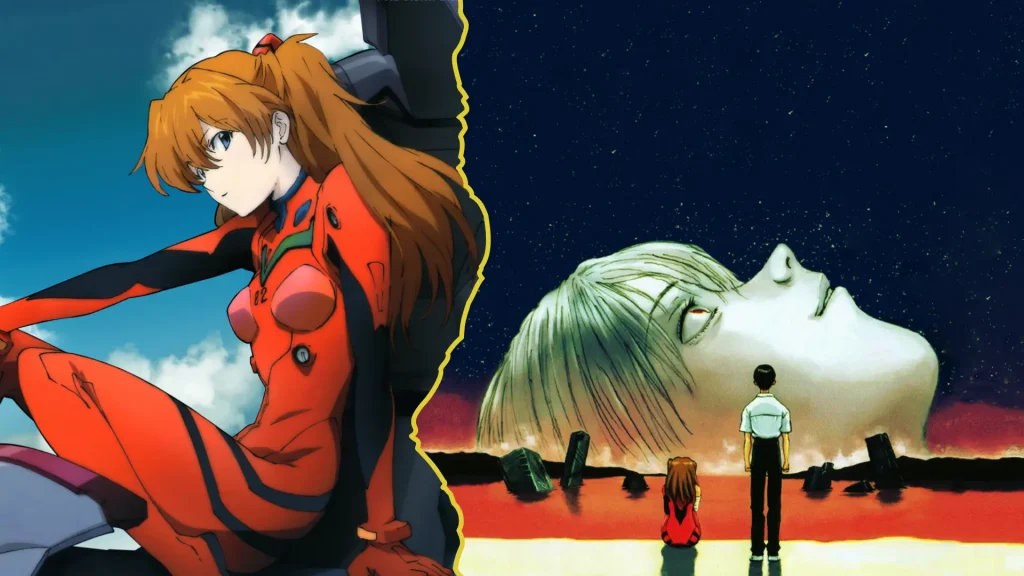For almost 30 years, Neon Genesis Evangelion has been one of the most analyzed anime ever. Fans have picked apart every frame, symbol, and line of dialogue, often describing it as one of the most complex and meaningful shows out there. But now, an old interview clip with creator Hideaki Anno has resurfaced, and it might change how people see the series.

The interview comes from a 2004 episode of NHK’s Top Runner, but a more complete transcript recently showed up online in the Japanese online community. In it, Anno says directly: “Evangelion is often described as philosophical, but in reality, it’s not. It’s pretentious.”
That one sentence has sparked a ton of online discussion, because it seems like Anno is downplaying all the theories and meanings fans have debated for years.
Anno Says the Show Was Meant to Look Deep, Not Actually Be Deep
Anno explained what he meant by “pretentious.” He said the show was designed to appear intellectual, like there was something bigger going on, but that was mostly just for style.
He flat-out says: “In truth, there’s nothing underneath. No hidden meaning.”
Pretentiousness here means showing off one’s knowledge, and the word that best fits is “know-it-all.” The story of Eva, which seems full of mystery at first glance, is just staged to give off an air of something deeper going on. In truth, there’s nothing underneath, no hidden meaning.
That might be tough to hear for longtime fans who’ve spent hours reading about Evangelion’s religious symbols, psychology references, and philosophical themes. But Anno is being very clear: much of it was just made to feel smart, not because it actually was.
For example, in another interview he admitted that the Christian imagery was picked mostly for its visual impact. He and his team didn’t have a strong background in Christianity, they just liked the look and mood it created.
The “Intellectual Look” Was Meant To Please the Audience

Anno also talked about how he sees filmmaking in general. He considers it part of the service industry, something meant to give the audience satisfaction.
The mysterious tone and intellectual feel of Evangelion was part of that service. He wanted people to feel like they were watching something deep. But over time, he felt that it went too far.
He said the show became a form of emotional comfort, something viewers used to escape from the real world. That wasn’t what he wanted.
For me, filmmaking is part of the service industry. I always want to create something that gives the audience a sense of satisfaction.
Eva’s seemingly intellectual story was part of that service.
But with Eva, that service went too far.
Eva became a place of comfort for the audience — like an escape hatch from reality.
I didn’t like that. I didn’t want it to become a device that people used to run away from the real world.
So I felt that I couldn’t continue down that path anymore.
So eventually, Anno decided to take a different direction. He wanted to break the illusion, to “throw water” on the audience, as he put it. He wanted to wake people up from that emotional escape and get them to think about real-life struggles instead.
I wanted people to wake up, and that’s why I made the movies in a way that metaphorically throws water on the audience to jolt them awake.
A Shift in Tone: Confrontation Over Comfort
In later parts of the franchise, especially The End of Evangelion and the Rebuild films, you can see this change. Anno moved away from subtle hints and began confronting viewers more directly.
He believed fans were overanalyzing the show and missing the point. So he made the ending more raw and introspective, something that wouldn’t let people stay in their comfort zone.
This wasn’t just some artistic whim. Anno has spoken openly about his own struggles with depression during the time he made Evangelion. That’s where a lot of the show’s emotional weight comes from.
So while the intellectual “surface” might have been exaggerated, the emotional themes, like loneliness, anxiety, and self-worth, came from a very real place.
So Was Evangelion Fake Deep?
While a lot of the “intellectual” stuff was mostly for show, that doesn’t mean the entire series was meaningless.
Anno’s personal experiences are all over the show. The characters’ emotional issues , especially Shinji’s, came from Anno’s own mental state during production. He wasn’t faking that part.
He also made changes to the ending after realizing how some fans were using Evangelion as a form of escapism. He wanted to challenge that, not encourage it.
Letting the audience stay in their comfort zone forever is also a kind of service.
But in Eva’s case, I felt I couldn’t allow that anymore.
I thought shaking them out of it would ultimately be better for them.
To me, that too is part of being in the service industry.
This interview brings up a common debate: should a creator’s original intent matter more than how people interpret the work?
Anno might say Evangelion wasn’t actually deep, but for millions of fans, it still feels deep. Maybe that emotional response is what matters more than the creator’s original plans.
And even if the show was “pretending” to be philosophical, it clearly struck a nerve. People connected with it. They saw themselves in the characters. That impact is real, no matter what Anno says now.
